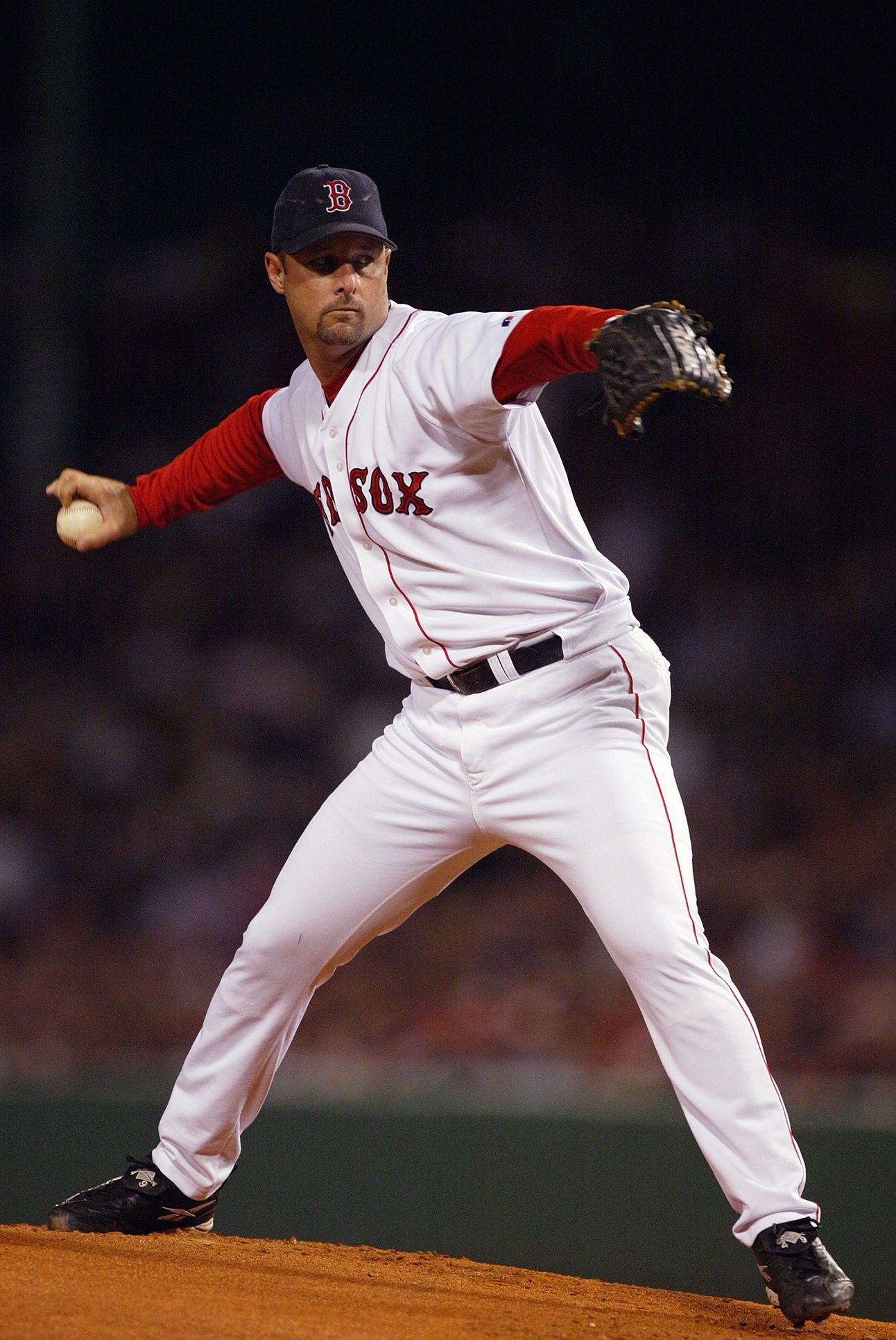
In today’s edition, after a day of rain cooled tempers, the Red Sox pulled even by winning Game 4 as Tim Wakefield’s knuckleball again frustrated the Yankees and he outdueled Mike Mussina.
If there was ever a time when two baseball teams and two rabid baseball fan bases needed a day off, this was it, and Mother Nature complied.
On the heels of the baseball apocalypse that had taken place on the hallowed grounds nestled within the triangle of Lansdowne, Van Ness and Jersey streets in the Kenmore section of Boston, menacing skies dropped more rain on Fenway Park than tear drops that had been spilled there across so many sad October days and nights. Which was saying something.
And so Game 4 would have to wait another 24 hours, thus affording both sides the opportunity to cool their collective jets and pull their focus away from brawling, beanballs and bullpen bedlam, and get back to the business of hitting, pitching and fielding. After all, there was a rather important prize at stake, the American League pennant, not to mention precious rivalry bragging rights.
“I don’t foresee any kind of replay of what happened,” Red Sox manager Grady Little predicted. “That kind of thing happens on a baseball field sometimes and you turn the page and go on with the next day’s game. That’s usually what happens and that’s what we expect. We know how important these games are, and if we lose focus of that, we don’t have any time to waste right now. We are down 2-1 in this series and we’ve just got to go out there and play baseball and that’s what we are putting our focus toward.”
Which is exactly what both teams did, and the Red Sox did it a little better.
In the coming days, Tim Wakefield was going to experience the worst moment of his long baseball career, but on this night - just like in Game 1 back at Yankee Stadium - the knuckleballer outdueled Yankee ace Mike Mussina and dominated the Yankees as Boston evened the series with another nail-biting 3-2 victory.

For the second time in four games, Tim Wakefield outdueled Mike Mussina and the Red Sox evened the ALCS at two games apiece.
“It was a huge game,” Wakefield said after he allowed just one run on five hits and four walks with eight strikeouts. “It was probably one of the most exciting games I’ve been a part of in my whole career. I pitched in the NLCS when I was at Pittsburgh (when he threw two complete game victories in 1992 against the Braves). But I was too young to know what was going on at that time. Now, 11 years later, I realize how hard it is to get to this level, to this stage of the playoffs, and you appreciate it a little bit more and understand how important these games are.”
Having now seen Wakefield’s knuckleball in six games in 2003, twice in the last six days, you would think the Yankees would have had some kind of idea how to hit it. He had thrown 599 pitches in those six games, probably 85 percent of them had been knuckleballs which is a pretty significant sample size, and the Yankees were hitting .195 with an on-base percentage of .253.
“Very frustrating,” Bernie Williams said.
But that was the thing with the knuckleball. You can’t construct a game plan against it. Literally every one that dances toward the plate is different. It’s not like a fastball that you can look for on the inside corner, or a breaking ball that is gonna end up on the outer corner. The knuckler comes floating in and it might go up, down, left or right, and the number of inches on the movement varies.
His comes in, it looks like it’s in the zone and moves out of the zone. Or it looks out of the zone and moves into the zone. It’s easy to say be patient, but it’s tough.”
Wakefield’s mastery of the Yankees was yet another reason why baseball was the most unpredictable and remarkable game because against this same lineup, Pedro Martinez, one of the best pitchers in the history of the game, so often struggled.
“He has come through very big for us in the two games he’s started here in this series,” Little said. “It couldn’t happen to a better fella. This guy has pitched well for us and he’s been very consistent throughout the season. We’re just glad he’s on our side right now. But I’ll tell you what, that was a well-pitched game by both pitchers. Mussina was on the top of his game and we were fortunate to come away with more runs than them tonight.”
Little was right, but that did not change the fact that this was becoming the postseason of discontent for Mussina. Joe Torre had decided that with the rainout, he would pitch Mussina on his normal rest and push David Wells back to Game 5. However, for the third consecutive start - the opener against the Twins in the ALDS and now twice against the Red Sox in the ALCS - Mussina was saddled with the loss. In fact, the Yankees had lost only three postseason games to date, all Mussina starts.
It’s not that he was terrible in any of the three games, especially in this one. He struck out 10 batters in 6.2 innings, and he was spotting pitches with both his fastball and his breaking stuff. Had the Yankee offense been able to do anything against Wakefield, this could have been a different result. Instead, with no run support, Mussina’s mistakes were amplified - solo home runs by Todd Walker and Trot Nixon - and that was just enough to do him in, something that had become a trend in October.
Since his brilliant, some would say series-saving performance in Game 3 of the 2001 ALDS against Oakland - the famous Jeter flip play game that turned everything around - and followed by his Game 2 ALCS defeat of the Mariners that year, Mussina had made six postseason starts for the Yankees. They had lost five with Mussina taking the defeat in four and his ERA in those six games was 4.98.
“I think they all hurt,” Mussina said. “It tends to aggravate you more each time.”
And that aggravation spilled into his post-game comments when the normally measured Mussina made some interesting remarks.
“I don’t bear all the responsibility (for the loss),” he said, a comment that probably surprised his teammates as much as the reporters. “I can only control 60 feet, six inches. The other stuff has to be attended to by other people, not me.”
One could interpret that as he was placing at least some of the blame for his unsavory results on his teammates, and to be fair, he had a valid point. The Yankees had scored only five runs in the three games he had started in this postseason, and in this game they went 1-for-9 with runners in scoring position and left eight men on base. Jorge Posada struck out with the bases loaded to end the first, and after Jeter’s RBI double in the fourth tied the game at 1-1, the Yankees had a big chance for more. With runners on second and third, Jason Giambi flied out, and after a walk to Williams loaded the bases, Posada lined out to kill the inning.
In a far less famous at bat, Aaron Boone whiffed on this Wakefield knuckler which gave Wakefield a postseason career-best eight strikeouts.
Finally, after Ruben Sierra had homered in the ninth to cut the Yankee deficit to 3-2, Red Sox closer Scott Williamson struck out David Dellucci and Alfonso Soriano to end it.
“He pitched well enough to win,” Yankees pitching coach Mel Stottlemyre said. “We didn’t get him any ammunition. The other guy pitched a heck of a ballgame.”
Mussina’s dissatisfaction wasn’t limited to the Yankees punchless offense. There was a big play in the seventh when the Red Sox loaded the bases with one out, and Mussina got pinch hitter Jason Varitek to hit a grounder to Jeter. He fed Soriano, but the second baseman was slow on the pivot and couldn’t turn the double play even with Varitek running. That allowed the third run against Mussina to score, a run that proved vital in the end.
That was Mussina’s last batter, and as he walked off the mound it was clear he was not happy. “We seem to play OK when I don’t pitch.” he said. “Let the other (starters) have at it, and we’ll win the series and go on.”
Though Jeter would never have directed blame anywhere but himself, he probably understood Mussina’s frustration. Through four games the Yankees had only 14 runs, were batting .192 as a team and were 7-for-31 with runners in scoring position.
“We just didn’t score enough runs,” Jeter said. “When some guys are scuffling, other guys have to pick it up. I thought we had better at-bats tonight than we did against him before. We had guys on base and opportunities to score, we just couldn’t get the big hit.”
So, four games were in the books, each side winning two. The series was proving to be every bit as awesome and dramatic as everyone thought.
“No matter how it looked after we won the first game in New York, no matter how it looked when they won Game 3 here, everyone has known all along this was going to be a hell of a series,” said Kevin Millar. “We have two great teams. It’s 2-2. It’s gonna be a dogfight.”
NEXT WEDNESDAY: David Wells often drove Joe Torre crazy, but one thing you could always say about the portly lefty is when he was at his best, he was tough to beat, and that was the case in Game 5 at Fenway Park.


